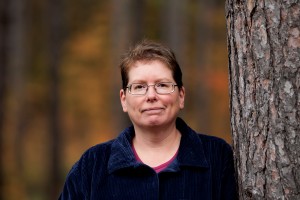by John Gagnon, promotional writer
 Professor Kathy Halvorsen has just completed what she calls “the greatest honor” of her career–membership on a select national committee on bioenergy that examined the economic and environmental impacts of increasing biofuels production. Halvorsen, who has a dual appointment in the Department of Social Sciences and the School of Forest Resources and Environmental Science, served more than a year on the committee, which comprised 16 experts from academia and industry. The committee, part of the National Research Council (NRC), began its deliberations in January of 2010. The NRC is part of the National Academies, which advise the nation on science, engineering and medicine. Halvorsen studies the relationships between people and the environment. She earned a position on the committee because her research has addressed forest policy dimensions of bioenergy development, as well as the attitudes of landowners who would have to supply the feedstock for biofuels. The dialogue among the group was intensive. “We discussed, discussed, and discussed. We wrote, and wrote, and wrote,” Halvorsen said. (The result is a book: see below to download a free copy.) Halvorsen says that biofuels are a decidedly complicated matter. “There are many dimensions intermingled,” she says. They involve energy, agriculture and the environment; they have social and technological implications; they impact an “almost infinite” number of ecological systems around the globe; they affect both the consumers who would use the product and the landowners who would supply the feedstock; simply put, they comprise the “most complex energy source.” How this industry might evolve is murky, for there is no measure; the US doesn’t have the plants to produce advanced cellulosic biofuels on a commercial scale. As well, the initiative is controversial. Halvorsen says, “There are very strong advocates for biofuels. There are equally strong sentiments against biofuels. Some argue that it will reduce greenhouse gases. Others argue the we can’t produce biofuels without negative impacts.” Corn, then, to fuel instead of food? One concern: “Will food costs go up and increase hunger globally?” Yet, the need is paramount: the US imports 55 percent of the nation’s consumption of crude oil and is not on a congressionally-mandated course to achieve a substantial increase in advanced biofuels by 2022. There are a host of uncertainties between now and then, Halvorsen says: * We don’t know much about growing, harvesting and storing cellulosic ethanol feedstock on a commercial scale. * We don’t know how well conversion technologies will work nor what they will cost. * We don’t know how landowners will alter their production strategies. In sum, she says, “It’s impossible at this point to come up with quantitative answers to these questions.” One certainty: the drivers for expanding this technology include crude oil prices; feedstock costs and availability; appropriate and efficient technology; changes in land use; and government policy. Halvorsen sums up the committee’s work as having framed the dialogue: “Our hope is that this scientific evaluation sheds some light on the heat of the debate, as we have delineated the issues and the consequences as we see them, together with all the inherent uncertainty.” The NRC committee’s report is titled, “Renewable Fuel Standard: Potential Economic and Environmental Effects of US Biofuel Policy.” To download a free copy, see Biofuels. |
The Ecosystem Science Center has announced the recipients of its 2010 Fall Graduate Student Travel Grants. Following is the list of recipients and their advisors.
- Sinan Abood, Environmental Engineering (Ann Maclean, SFRES) received $500 to attend and instruct a special session at the ASPRS/CaGIS 2010 Fall Specialty Conference in Orlando, Fla., from Nov. 15-19.
- Ruth Bennett, Applied Ecology (Joseph Bump, SFRES) received $421 to attend the XIV Congreso de la Sociedad Mesoamericana para le Biologia y la Conservacion in San Jose, Costa Rica, from Nov. 8-12.
- Marcella Campione, Forestry (Linda Nagel, SFRES) received $500 to present a poster at the Society of American Foresters National Convention in Albuquerque, N.M., from Oct. 27-31.
- Nan Davis, Forestry (Robert Froese, SFRES) received $500 to present a poster at the Society of American Foresters National Convention in Albuquerque, N.M., from Oct 27-31.
- Kevyn Juneau, Forestry (Catherine Tarasoff, SFRES) received $500 to give a talk at the MN/WI Invasive Species Conference in St. Paul, Minn., from Nov. 8-10.
- Laura Kangas, Applied Ecology (Rodney Chimner, SFRES) received $500 to give a talk at the Wetlands in the Landscape Meeting of the Wisconsin Wetland Association, in Baraboo, Wisc., from Feb. 16-17.
- Trevor Roberts, Forest Ecology and Management (Robert Froese, SFRES) received $500 to present a poster at the Society of American Foresters National Convention in Albuquerque, N.M., from Oct. 27-31.
- Agustin Robles-Morua, Environmental Engineering (Kathy Halvorsen and Audrey Mayer, SS) received $500 to give a talk at the American Geophysical Union in San Francisco, Calif., from Dec. 13-17.
- Shawna Welsh, Applied Ecology (Thomas Pypker, SFRES) received $500 to give a talk at the Midwest Fish and Wildlife Conference in Minneapolis, Minn., from Dec. 12-15.
- Nick Windmuller, Forestry (Robert Froese, SFRES) received $500 to present a poster at the Society of American Foresters National Convention in Albuquerque, N.M., from Oct. 27-31.
- Rosa Flores, Environmental Engineering (Judith Perlinger, CEE) received $500 to present a poster at the American Geophysical Union in San Francisco, Calif., from Dec. 13-17.